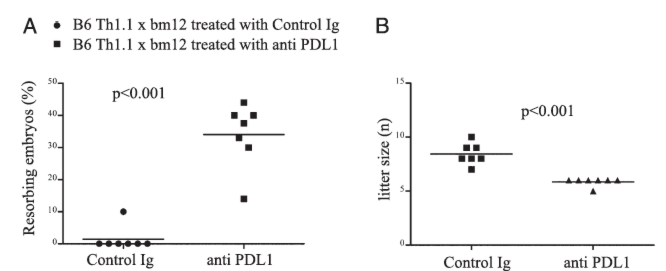Fetomaternal tolerance has been shown to depend both on regulatory T cells (Tregs) and negative signals from the PD1-PDL1 costimulatory pathway. More recently, IL-17-producing T cells (Th17) have been recognized as a barrier in inducing tolerance in transplantation. In this study, we investigate the mechanisms of PDL1-mediated regulation of fetomaternal tolerance using an alloantigen-specific CD4(+) TCR transgenic mouse model system (ABM-tg mouse). PDL1 blockade led to an increase in embryo resorption and a reduction in litter size. This was associated with a decrease in Tregs, leading to a lower Treg/effector T cell ratio. Moreover, PDL1 blockade inhibited Ag-specific alloreactive T cell apoptosis and induced apoptosis of Tregs and a shift toward higher frequency of Th17 cells, breaking fetomaternal tolerance. These Th17 cells arose predominantly from CD4(+)Foxp3(-) cells, rather than from conversion of Tregs. Locally in the placenta, similar decrease in regulatory and apoptotic markers was observed by real-time PCR. Neutralization of IL-17 abrogated the anti-PDL1 effect on fetal survival rate and restored Treg numbers. Finally, the adoptive transfer of Tregs was also able to improve fetal survival in the setting of PDL1 blockade. This is to our knowledge the first report using an alloantigen-specific model that establishes a link between PDL1, Th17 cells, and fetomaternal tolerance.
The link between the PDL1 costimulatory pathway and Th17 in fetomaternal tolerance.
D’Addio F, Riella LV, Mfarrej BG, Chabtini L, Adams LT, Yeung M, Yagita H, Azuma M, Sayegh MH, Guleria I.
J Immunol. 2011 Nov 1;187(9):4530-41.

